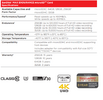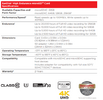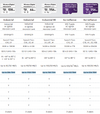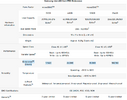I'm a pharmacist so help me understand something...
When a drug manufacturer has an expiration date(or shelf life) on a medication, it means that is defined as the time necessary for the
drug to decay to 90% of its original concentration, also known as T90.
So of course if I see 2 different medications of Tylenol, Paracetamol, or Acetaminophen 500mg on the shelf...I will always purchase the one with the latest expiration date because on the date of expiration that 500mg tablet will be performing at the 450mg level even though it might still be sitting on the shelf pretending to be a 500mg tablet a few days prior to expiration.
So if I see several cards(SanDisk Max Endurance, SanDisk High Endurance, Western Digital Purple, Samsung PRO Endurance, etc...) all rated for continuous video recording and warrantied for dashcam/CCTV use, and they're also an endurance (or in this case an industrial) card, I will always go based on what I consider to be the best available at the reasonable price and memory size that I am looking for taking read/write speeds of the memory and what I will be using it for(whether a drone or a dashcam) also into consideration. Obviously I won't pay $245 just because a card is warrantied for 50 years or 1 million hours of continuous video recording because that is out of my price range, and also both the dashcam and I may long be dead by then.
It is a bit more complicated than that.
A card with 3000 write cycles rating may work fine in a Viofo A129 Pro when the card is new, but over time it will slow down, and at some point it will become too slow to keep up with the data rate from an A129 Pro Duo set to maximum bitrate. That may come after 800 write cycles, or maybe after 2800, and after it stops working, the card may still work fine in a computer that is just copying files to the card at whatever speed the card can cope with. So the card manufacturer can rate that card at 3000 write cycles even if it becomes too slow for the A129 Duo at max bitrate after only 800 write cycles, and too slow for an A119 Mini set to Normal bitrate after 2500 write cycles.
So the specifications for write cycles and TBW do not give the full story, and the U3 rating also doesn't give the full story, since U rated cards don't have to guarantee any write speed, only an average write speed, given that the writing device can buffer data at times when the card is running slowly because it is busy doing something.
A good card doesn't actually need to be as fast as U1, a class 10 card is fine for current dashcams, but it does need to maintain the write speed without long delays, even when the memory cells have slowed down through use, and even when it is handling a few failed cells, and even when it is busy deleting files (blocks) because the dashcam has been recording continuously for hours, never giving the card time for maintenance, emptying the delete queue or carrying out wear leveling!
In this case though we have something to go by...even if it does not tell the full picture as you stated but those other numbers also help in the calculations.
I guess my point here is that at the end of the day in most cases, a warranty is how confident the manufacturer of that product believes that it will perform at it's rated specifications which is why I tend to lean more on the warranty angle than quoted write cycles or video hours recording...But those other numbers are important too if cited by the manufacturer.
In this case I can only compare "1 year" of warranty quoted by the Viofo memory manufacturer for vs. "X years" of warranty of a SanDisk, Western Digital, or Samsung working in the same dashcam at the same maximum bitrate setting.
The same for BlackVue which only offers a "6 month" warranty on their memory cards which I assume is based on continuous recording? I have no idea if theirs is considered an industrial or a consumer card...but it speaks volumes about how long they expect the product to last performing at their defined specification for dashcam use?
Yes, in a lot of these cases nobody records 24/7 in a dashcam...but if you have a CCTV camera and you switch memory between both devices regularly then it all of a sudden might become relevant. This of course may not apply to cloud cams like Google Nest or Ring cameras since everything with them is all about the cloud.
It's true that the cards do not guarantee a specific write speed, they usually say "up to" xyMB/s. One thing I do is test any card I receive immediately using CrystalDiskMark, H2testw, and other software multiple times to check file allocation and if it is also not performing anywhere near the cited read/write MB/s specification, then it gets returned.
Most consumer cards have warranty for x number of write cycles, very few will warranty flash memory for 1 year. Some of them will honour a warranty claim after several years, if it is still below ? write cycles. They never tell you what ? is, and if you reach ? after 3 months then the warranty is void after 3 months.
I think Viofo warranty their cards for 1 year on the basis that when used in their dashcams, it will last over 1 year, even if the dashcam is recording continuously. For most customers, that is much easier to understand than using write cycle counts or hours of FHD video (Viofo don't make many FHD dashcams). It is also something that can be tested, and I guess Viofo's supplier has done the necessary tests, and that Viofo ensure that their cameras don't exceed a specified write count within a year.
Dashcams do make life difficult for the memory cards, they write continuously, don't provide big buffers to allow the cards to carry out maintenance tasks, do write to multiple files simultaneously, do delete files while recording new ones, etc.
My understanding is that manufacturers warranty their memory cards based on the X number of write cycles or the number of years since purchase as cited in the warranty terms...Whichever happens first. I don't really see anything ambiguous about that.
If a card manufacturer decides to still honor it after one of the numbers has been reached but the other has not, then kudos to them. But I will always assume in my calculations that it is whatever is reached first...The number of years warranty since purchase, or the number of write cycles/hours of FHD video...Not both.
Whether the manufacturer quotes hours of FHD video, we can do the math to 2K, 4K, and so on...If that is what the dashcam one uses to record.
Things like bitrate are not relevant(and if they are, then they can easily again be calculated & converted using mathematics just like resolutions and the number of camera channels) because regardless of what memory I pick, I will only be using it in one dashcam running at the maximum bitrate setting possible.
The same with using "normal" or "maximum" bitrates in the dashcam, we can also do the math if we know the fine print of what the FHD video is recorded at which is usually always noted by a footnote, subscript, superscript, or asterisk in the manufacturer specifications datasheets.
Those same manufacturers also use warranty years for any customer that is confused by write cycle counts, hours of FHD video, or does not want to bother doing the math can also make a safe choice by just going by the warranty years specified by the manufacturer for continuous recording then since all these memory cards are rated for continuous recording anyway?




